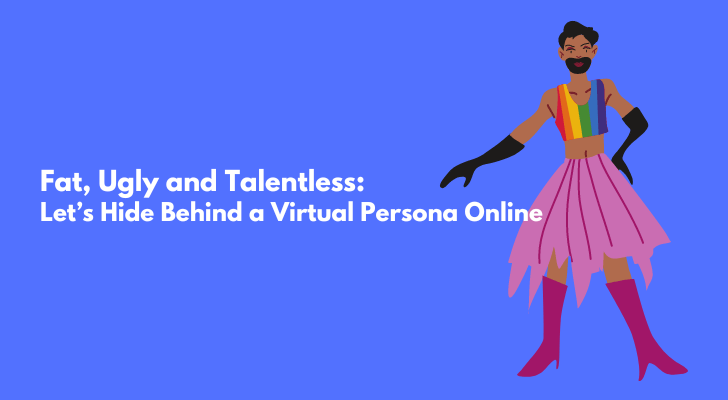It's not uncommon to find people pretending to be something they're not online. Half of us use this platform as a way to gain attention by exaggerating qualities - giving the illusion that our lives are extraordinary. The other half choose to remain anonymous behind avatars, concealing identifying details and engaging in conversation without fear of judgment or scrutiny.
Both types of users present distinct advantages; those who choose to stay anonymous may enjoy being able to engage in conversations without worrying about how others perceive them while those who draw attention may benefit from an increase in followers or recognition for their talents.
Anyone can create their own larger-than-life character on the internet. It's a good thing, right?

Did You Know?
- About 60% of online users feel more comfortable expressing themselves through an avatar.
- Nearly 50% of people using virtual personas say it helps them escape real-life discrimination.
- Approximately 70% of users of virtual worlds report they can express aspects of their personality they feel unable to in real life.
- 40% of online gamers feel that their virtual persona represents their ideal self.
- 55% of virtual persona users feel less judged based on their physical appearance.
- About 30% of users adopt a virtual persona to experiment with different identities.
- Around 65% of users feel that interacting through a virtual persona boosts their confidence.
Fat, Ugly and Talentless - The Reality
“Nobody is perfect, everyone has their own strengths and weaknesses, and your worth as a person is not determined by your appearance. You deserve to be treated with kindness and respect, both by others and by yourself. Blah.
Then why do pretty people with Pantene hair get half a million followers on Instagram within 10 days of opening an account, while less than ordinary people like us struggle to have 100?
Janis Ian learned the truth at seventeen - people tend to be attracted to aesthetically pleasing visuals, so those who are conventionally attractive may have an advantage in gaining followers.
Again, it’s not the number of followers or likes, it’s what you do and your qualities. But the number is a reflection of your credibility. It does matter when promoting a business of your own.
Fat and ugly average Joe/Jane. You’re only talented in your own right. “Show your true self to build audience trust”? You’ve tried and tried, exposed yourself inside out and nobody’s interested. Then what next? Create an idealized version of yourself. Use your virtual persona well, do what you want to do with it, and see if it becomes better than the real you.
Did You Know?
- Nearly 25% of people report that they experience less anxiety when using a virtual persona.
- 35% of users believe their virtual persona has talents they do not possess.
- 45% of virtual environment users feel their online persona is more socially successful.
- About 20% of people using avatars believe it helps them cope with social rejection.
- 15% of users say their virtual persona has helped them deal with personal trauma.
- 50% of users in virtual communities feel that these platforms provide a sense of belonging.
- Approximately 10% of people prefer their virtual lives to their real ones.
Cancel Culture
We are living in a cancel culture - where we must be held accountable for our actions, which is a good thing. But we’re now severely criticized or even ostracized for expressions that are considered offensive.
Although this has led to concerns about fairness, due process, and the potential for mob mentality, it is what it is. Even comedians find it harder to make fun of others. You say one word wrong publicly and you are dead - lose your job and reputation. Or maybe it’s too late. It’s a matter of time before someone finds your tweet from 10 years ago and out you as a bully, racist, misogynist, or homophobic.
Cancel culture expects you to be respectful to everyone, and if you have a good sense of justice you can probably survive that. But it’s much harder for people like me with ASD, for example. I try my best to “be correct” but never know when I will step on a landmine - there’s always a fear of making a critical error forever.
Using a virtual persona is a convenient way to get away with that kind of situation. If you - your virtual persona - ever say something wrong and become a bad guy, you can kill it off before it’s “cancelled”.
Create an Alter Ego

Millions of social network users take advantage of anonymity and behave in any way they want. They say things that they wouldn't say in person because they don't care about accountability.
But when it comes to selling stuff online, interacting with others under the guise of a false persona can be unethical and deceptive. It can damage your credibility and trustworthiness, and may even harm your relationships with others. The internet is not a private space and your actions online can have real-world consequences. Even if you're using a pseudonym, it's still possible for others to track you down or for your online activities to be traced back to you.
Whereas when we create alter egos, we look for positive outcomes - we aim to experiment with different sides that we have and represent the best - or better - version of ourselves. It takes some courage to do it in real life, but it's certainly easy online, isn't it?
This hidden knowledge used by the elites will let you generate wealth and prosperity

Did You Know?
- 60% of virtual community users say they can discuss topics online that they wouldn't in person.
- Nearly 33% of virtual persona users say they have experienced positive changes in their real-life social skills.
- About 40% of online users admit that their virtual interactions influence their real-world behavior.
- 25% of virtual persona users have sought to change aspects of their real lives to match their online persona.
- 20% of users feel that their virtual experiences have improved their real-world problem-solving skills.
- Around 55% of users of virtual personas report a significant impact on their mental health, both positively and negatively.
Create an Avatar
Use an AI photo editor to create your avatar. A lot of AI-powered apps and online platforms are available that allow you to create customized avatars. New apps emerge all the time, so there's no particular one that I can recommend. One called ToonMe is good, and you may already know the one called FaceApp also. Just check your app store and try a few.
Make it clear that it's your avatar - don't use a stock photo and pretend that the photo model is you. That would be misleading and could undermine the trust of others in your online interactions.
Let Your Online Persona Run Wild

The whole point of creating an alter ego online is to allow it to speak on your behalf about things that your normal self would be hesitant to say. Even if you’ve always been honest and transparent so far, you’ve already tried it and didn’t work; people didn’t take your words as seriously as you wanted them to. Then take revenge. It’s time to let your newly created persona run wild.
Just remember that your online persona is still a representation of yourself, so be responsible and mindful of how your actions may affect others, of course.
Your alter ego will;
- Be bolder and take more risks.
- Be more confident and assertive.
- Be more positive and optimistic.
- Be more creative and open-minded.
- Be more courageous and resilient.
Your alter ego is naturally creative and open-minded, so let them show you new ways of thinking and doing things. Instead of sticking to the same old routines, allow yourself to explore different possibilities and try something new now and then. You may be surprised by what you discover!
When life throws you a curve ball, your alter ego will remind you that you can handle it, no matter how overwhelming or difficult it may seem. No matter what obstacles come your way, your alter ego will give you the courage and resilience to keep going - and help you find a way through any challenge that comes your way.
Conclusion (There Isn't)
Yes, it’s better to focus on developing genuine relationships and connections based on shared interests and values. Being true to yourself and focusing on your own personal growth and well-being is more important than seeking validation or attention from others online.
No one is perfect, that’s true. But near-perfect people get more attention and admiration online. Would you create a near-perfect alter ego that allows you to embrace the person you want to become and make it a virtual reality? It’s only temporary, and you’ll make money quicker that way.
Or would you stay true to your fat, ugly and talentless self but keep focusing on your personal growth, developing genuine relationships based on shared interests, values, and… [stop.]


Affiliate marketing is so saturated now. Every post on this topic promises success but fails to mention that most people won’t make anything substantial. It’s not the cash cow people think it is.
Agree! Thanks for your comment. We wish you all the best!
I really enjoy your writing style but I recommend avoiding insults like talentless or fat because nobody should lower themselves like that. Without it, it would make the article even stronger.
Thanks for your comment Carrie, I never meant to insult anyone though. Millions of people including business owners suffer low self esteem.
It’s true that we no longer able to tell the person is real or not on blog as written by AI and photos are AI generated. Things are better now that we can only trust real people and real people can only be found off line.
Thanks for your comment, I agree!
I really appreciate you sharing your honest feelings. It’s brave to admit that you’ve been hiding behind a virtual persona. I can relate to feeling like I don’t fit in sometimes. It’s important to remember that your worth isn’t defined by your appearance or what you can do. Everyone has unique talents and qualities. Have you considered reaching out to a therapist or counselor? They can provide support and help you work through these feelings.